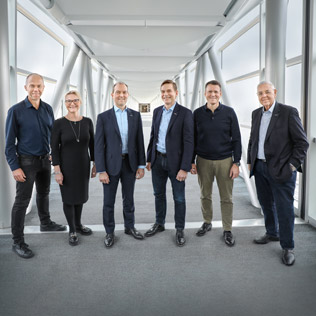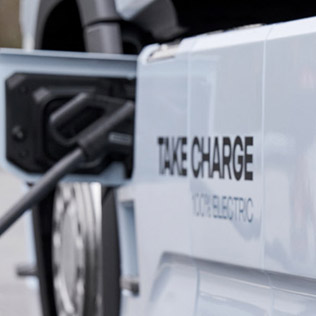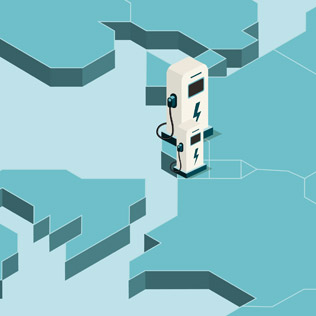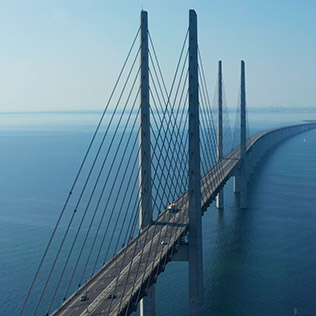Adding value with
a modular system
There’s no need to reinvent the wheel, as the saying goes. When it comes to the TRATON Modular System, this couldn’t be truer: instead of developing individual solutions multiple times, the TRATON GROUP brands rely on shared components with standardized interfaces. This enables the Group to pool its resources efficiently.
The transport sector, and with it the transportation industry, are undergoing the biggest transformation in history: combustion engines are gradually being replaced by electric drives, vehicles are becoming more connected, and autonomous trucks are soon to become part of everyday life. “All of this poses enormous challenges for our product planning,” explains Björn Leksell, Head of Group Product Planning in the TRATON GROUP. This cross-brand organizational unit is mainly responsible for the strategic product roadmap and for overseeing the governance for the corresponding decision-making bodies. “It doesn’t make sense for each of our brands to develop the answers to these challenges themselves,” says Leksell.
In the face of increasingly complex customer requirements and new technologies popping up, how can we succeed in developing attractive and competitive products that can simultaneously meet the varying and individual customer requirements of the four brands? The answer to this is the TRATON Modular System, or TMS for short. Group Product Management (GPM) together with Group Research & Development (R&D) have the task to create and implement the TMS. “That is our strategy for achieving both external effectiveness and internal efficiency. The GPM team needs to describe, aggregate, and quantify the customer needs and strategic brand ambitions by following three well-defined modularization principles: same needs – identical solutions; standardized interfaces, and well-balanced performance steps,” explains Leksell.
Modularity is nothing new in the Group. Since as early as the 1930s, Scania has been using the “Bygglådan” principle, derived from the Swedish word for “toolbox”. What is new is the consistent implementation of this kind of a modular principle across all brands. “The TMS gives us a shared basis, a platform we can use to develop brand-independent products and services. It enables our brands to offer multiple variants of customized products, fulfilling customer requirements,” explains Dr. Mathey Wiesbeck, Head of GPM Business Development in the TRATON GROUP.
At the interface with Group R&D, Group Product Management is then responsible for translating these requirements into technically feasible solutions with profitable mass customization. “A thorough analysis of all brands’ demands gives us the full picture of components, parts, and services that need to be developed independently from the brands. By combining these, we can create a significantly broader range of possible products for each brand. This portfolio benefits our customers across the globe,” says Wiesbeck. The Group R&D department then plays a major role in the solution development across all brands.
“The TRATON Modular System gives us a shared basis, a platform we can use to develop brand-independent products and services.”
Dr. Mathey Wiesbeck, Head of GPM Business Development in the TRATON GROUP
Modularity itself is not a
customer benefit
“From a technological perspective, the heart of the TMS is translating customer requirements into technical solutions using a sophisticated user-factor methodology and prioritizing the standardization of interfaces,” explains Niklas Hammarström. As Head of Vehicle Portfolio, Hammarström is responsible for the TRATON GROUP’s truck and bus portfolio, i.e., for all products relating to end customer applications. “With the TMS, we only need to develop and integrate components once. Then we can plug and play these products globally thanks to the standardized interfaces,” says Hammarström. This speeds up the market launch of new products enormously, and the modular system makes everything reusable. “Once we have developed a solution, we can reuse it globally,” says Hammarström. “This way, we achieve more customer value from one single development.” Ultimately, the TMS also reduces product and integration costs.
“With the TMS, we as a global Group can offer better performance, which means our customers get better products,” adds Hammarström. “Modularity itself is not a customer benefit. But the result of modularity is added value for our customers.” This is because our customers will be able to choose from a large number of variants without significantly increasing the complexity for TRATON. At the same time, the Group’s brands can differentiate themselves efficiently by tailoring and adapting their product offering to their customer base. “What the customer — and therefore the brand — ultimately wants is a complete vehicle,” explains Wiesbeck. The GPM has a portfolio management system for this purpose. “With this, the Group ensures that the individual requirements of the customers and the brands are catered for in the TMS,” says Hammarström.
Develop once and use
again and again
Standardized interfaces are crucial for moving from modules to finished products. Hammarström cites battery packs as an example: “If I have battery packs and standardize the interfaces, I can move and arrange these packs however I want. This means they fit into different vehicle configurations. I can then build very different vehicles with the same battery pack. Different battery sizes can be combined in the same architecture with different performance steps. We can develop the technology once and use it again and again.”
In order for this to succeed, there are both organizational and technical challenges that need to be overcome. Each brand comes from its own platforms and systems, which it uses to develop products. These platforms need to be consolidated. “The aim has to be that a product developed jointly by Group R&D can also roll off the production line at Scania, MAN, Navistar, or Volkswagen Truck & Bus,” explains Wiesbeck. “This is a huge challenge from a data perspective. Our answer is an intelligent way of bundling requirements and developing common solutions that all brands can use, while at the same time ensuring that our brands remain distinct and that we can meet a wide range of different customer requirements.”
Your turn: scroll to see how the modules fit into different vehicles!
Continue to the experts

“Group Product Management needs to describe, aggregate, and quantify the customer needs and strategic brand ambitions by following well-defined modularization principles.”
Björn Leksell, Head of Group Product Planning in the TRATON GROUP

“A thorough analysis of all brands’ demands gives us the full picture of components, parts, and services that need to be developed independently from the brands. By combining these, we can create a significantly broader range of possible products for each brand. This portfolio benefits our customers across the globe.”
Dr. Mathey Wiesbeck, Head of GPM Business Development in the TRATON GROUP

“Once we have developed a solution, we can reuse it globally. This way, we achieve more customer value from one single development.”
Niklas Hammarström,Head of Vehicle Portfolio in the TRATON GROUP
TRATON GROUP values
There is a clear connection between the TRATON GROUP’s corporate values and the TRATON Modular System (TMS), as Dr. Mathey Wiesbeck explains.
Customer First
Mapping the customer requirements of several brands and delivering them efficiently to the customer is the foundation of the TMS. Because of this, Customer First is the starting point and purpose of the TMS.
Respect
We are four strong brands, each with its own advantages: be it a special market position, greater growth potential, or a premium claim. Respect for the individual strengths of the brands is also reflected in the structure of the TMS.
Team Spirit
Where there is respect, there is team spirit. Merging the development departments of the four brands into one Group-wide Research and Development department, and into one joint Group Product Management, can only work with team spirit.
Responsibility
Our brands have always had a responsibility to their customers and have been accountable for results, and this will remain the case. The TMS strengthens the independence of the brands and their responsibility toward customers.
Elimination of Waste
Operational excellence is the basic prerequisite for our success in the market. Elimination of Waste is an accurate reflection of this, for example when we consolidate four product management or four development departments into one base. This way, TRATON can make better use of its human resources and deliver the required solutions faster.




